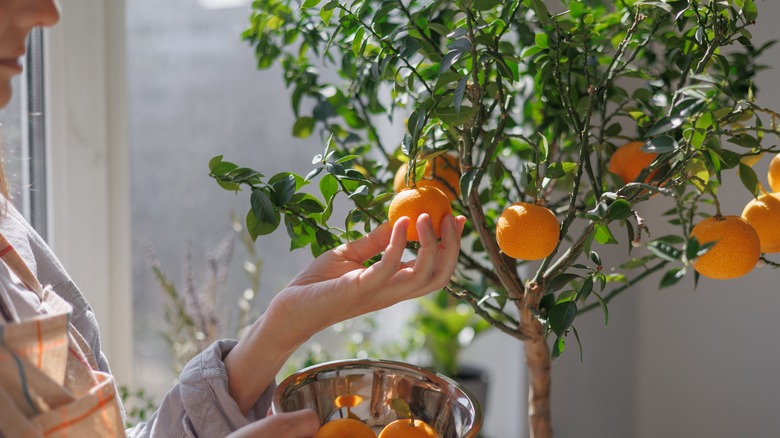Why Do People Use Orange Peels To Deodorize Smelly Shoes & Does It Work?
One day, you're relaxing, feet up after a long week of work, when suddenly you're hit by an odor. You're bowled over by the pungent aroma of those workout shoes by the door, the stink carried over by a breeze coming through the window. What else can you do other than toss your shoes out of the closest window (don't do it; that's littering) or hide them in a closet? Well, if you have a bowl of oranges sitting around, you can have yourself a snack and save the peels to work their magic on your odorous shoes.
Orange peels are good deodorizers partly because of their makeup. Orange and other citrus fruits' skins are called piths, which are super porous and therefore able to absorb odors. You don't even have to use just the peels to take advantage of the natural citrus odor goodness — you can simply cut slices and use them in your shoes. However, you don't get to eat the oranges, which makes this hack less tasty.
"The peel will absorb odor and moisture like a sponge, plus release a pleasant citrusy aroma," Noell Jett, author of "Create Your Dream Home on a Budget" told First for Women. "The essential oils in the peel gives off a fresh citrus smell plus the oil and the citric acid are antibacterial so they will fight the bacteria that cause the odor." We know anecdotally that citrus oils can cover smells, but do they really help eliminate them?
Citrus contains oils used in deodorizers
Citrus fruits like oranges contain a lot of different oils, which is why there are so many uses for citrus around the house. Limonene, linalool, and citral are among them, according to the National Library of Medicine. These three oils are also frequently found in odor absorbers, so it only makes sense that one can just skip a step and use the peel to deodorize. While it isn't proven whether the oils absorb odor or simply cover them up, scientists have found that they hold antimicrobial properties. Antimicrobial products do, however, kill or prevent bacteria, which can lead to stinky smells.
Although citrus peels can help reduce smell in shoes for a period of time, it is important to note that the relationship of the smelly bacteria is not with the shoe itself but with the foot inside it — which may very well continue to smell stinky in the future. "Most people think that textiles treated with antimicrobials will solve the problem by killing the bacteria, but the bacteria create the [odor] on our skin and these compounds are taken in by the clothing [fibers], so, it's not just about bacteria anymore," said clothing and textiles scientist Rachel McQueen of the University of Alberta. An orange peel in a shoe won't make smelly shoes a thing of the past forever, though they certainly help in small increments.

